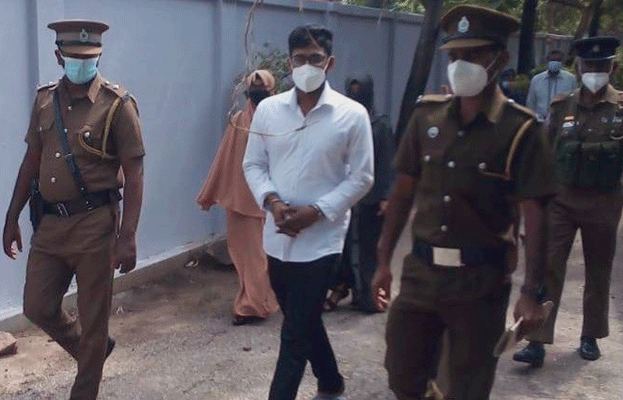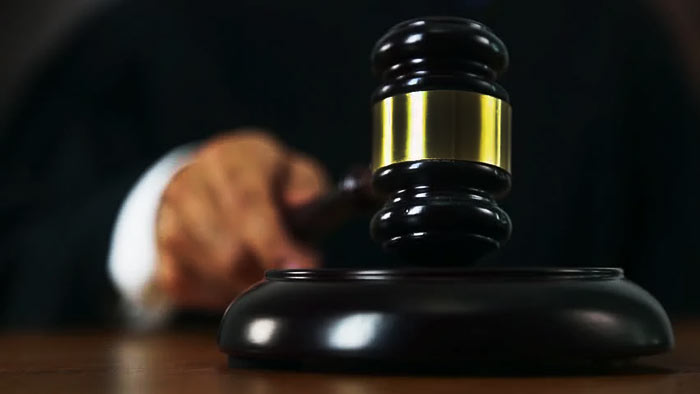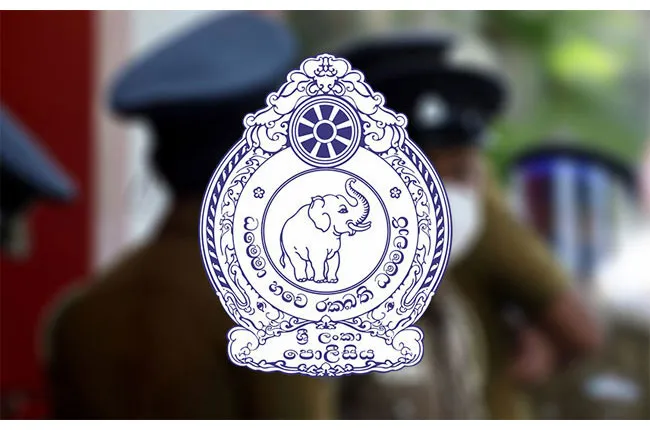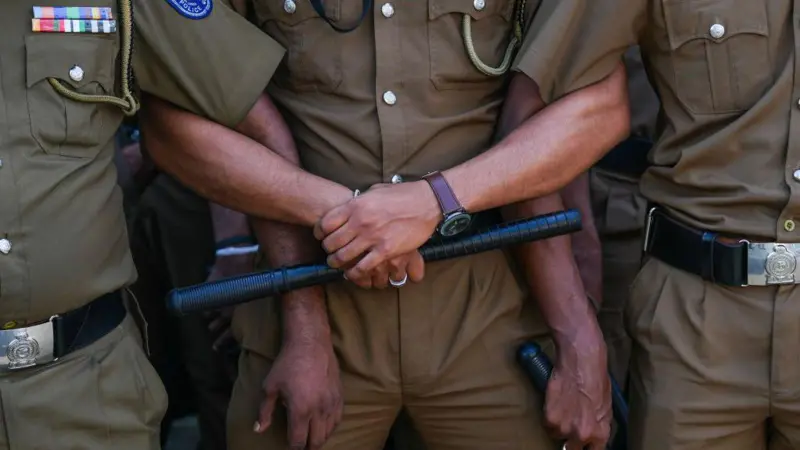Former PTA detainee poet : says they threatened to detain him for 20 years if he did not sign a confession
Ahnaf Jazeem, a poet and teacher from the East of Sri Lanka, was arrested in May 2020 under the Prevention of Terrorism (Temporary Provisions) Act No. 48 of 1979 (PTA). Initially arrested in connection to his Tamil-language poetry anthology, titled Navarasam, which the authorities alleged to be promoting “extremist” ideologies, Jazeem was finally granted bail on 15 December, after over a year in prison.
Speaking to the media for the first time since his release, Jazeem recounted to The Morning his experiences following his arrest, his thoughts on the PTA, and his future as a writer. He noted how allegations against him attempted to connect him to the “Save the Pearls” charity organisation, through which his accusers allegedly sought to force him to falsely confess to a connection to lawyer and human rights activist Hejaaz Hizbullah – who was similarly taken into custody under the PTA on 14 April 2020.
Following are excerpts from the interview:
To start off with, can you tell us when you were arrested and what you were doing prior to your arrest?
I was arrested on 16 May 2020. I taught at an international school in Puttalam – it was a private school. While I was teaching there, they offered me living quarters. After I had been living in the quarters for three months, the country closed down due to the coronavirus pandemic and I went home. While I was going home, the Save the Pearls and the Hejaaz Hizbullah case came up, and they (officers from the Terrorism Investigation Division [TID]) searched my quarters. I had left a lot of clothes, my own books, and the books which I read there. They took all of those books.
After that only they arrested me at home. I started working at the school in June or July 2019. I lived in those quarters for three months only. From 2012 to 2019, I studied at the Jamiah Naleemiah Islamic Institute in Beruwala, where I studied Arabic, Islamic studies, literature, and sociology. I did my Advanced Levels there. I completed one year in the external degree programme at the University of Peradeniya in 2019 and I’m still waiting to finish that. I taught Tamil and Tamil literature at the school for Grades Nine, 10, and Ordinary Level classes.
Their initial accusation was that you were connected to the Save the Pearls organisation. Is that true? Are you in any way connected to them?
I am not connected to Save the Pearls. The quarters I lived in had belonged to Save the Pearls, but I just lived in the quarters that the school provided for me. Only after I was arrested, and when the TID inquired about it from me, did I learn of Save the Pearls. I learnt of Hejaaz Hizbullah only through the news when he was arrested.
When did you publish ‘Navarasam’?
I published Navarasam in July 2017. I wrote the poems before that and compiled them. It was my first book. I am only 26 years old.
What did the officers say at the time of your arrest?
When they came to my house, they asked me a lot of questions about Navarasam and they looked at all the books in the cupboard. I had about 105 copies there and they also took about 50 other books. When they arrested me, they said they just had a “small inquiry”. It was about four or five officers with one translator.
What languages can you speak?
I really like languages, and I can speak Tamil and Arabic. I can manage English and Sinhala – but cannot speak those two fluently.
Where did they take you after your arrest?
After they arrested me, they took me to the Vavuniya TID. I was thinking that I had not done anything wrong, and I went to the inquiry with the intention of supporting the State and the officers. That is why I went. I had no lawyer at the time.
What happened after you were taken to the Vavuniya TID?
When I was taken to Vavuniya, and I read the board that said “Terrorism Investigation Department”, that is when I was frightened. I have not done anything wrong. They questioned me about the school activities and what I taught children. They accused me of showing videos to chidren about ISIS and terrorism, and that I had given lectures supporting Zaharan. They also accused the Navarasam book of being connected to Zaharan and supporting his ideas.
They asked me about this until morning. I said that I had no connection to terorrorism or extremism. I asked them to read what I have written against terrorists. They still inquired a lot from me. They said that I have Christian books, Hindu books, and Islam books, but that I do not own Buddhist books. They inquired about that and asked for a reason. I said that I have read Buddhist books – two or three books – but I do not own them. The officers said because I did not own the Buddhist books, that I am a terrorist.
How long did they question you in Vavuniya?
They questioned me for two days straight in Vavuniya. They asked me questions in Sinhala and had a translator translate it to Tamil. They questioned me till morning – I was not given any sleep. When I was too tired, they let me sleep at 5.30 a.m. in the morning, but woke me up again at 8 a.m. for inquiries. They told me that I had to collect all copies of the Navarasam book and return it to them. I said that it was distributed and sold all over the country and I had no way of doing that.
They then put me in a vehicle and took me near my house. We collected about 10 copies of the book from the neighbours. Then two people from the Army came. They addressed me harshly, saying: “You are connected to Zahran. We are going to take you to Colombo and put you in the dark room for four years. No one will even know what happened to you.”
All I could say was that I didn’t know anything. They said that in both languages to scare me. They said that I went to Zaharan’s class and asked why I had done so and why I had written Navarasam. After two days, I was taken to Colombo. I had no lawyer then.
What happened after you were taken to Colombo?
In Colombo, they took me to the TID headquarters to start inquiries again, and accused me of being a terrorist. I spent 14 days from 18 May 2020 to 31 May 2020 on the second floor of the TID. They said that I had written a terrorist book and that I was spreading terrorist ideas through the book to students. They said this was connected to Zaharan and that I had taught students that his bomb blasts were good. I told them repeatedly that I did not support terrorism, that I am against terrorism, and that all my writing is against it. I repeatedly said I did not know anything about this. They kept me handcuffed and isolated for 14 days.
They forced me during this time to deliver a confession. They threatened me saying that they would keep me in prison for 15 or 20 years. At the time, I had a proposal for an arranged marriage – they threatened me saying that the girl would also be arrested. That is how they threatened a confession out of me.
Were you allowed to call your family or inquire after a lawyer at this time?
One week after I was taken to Colombo, I was allowed to call home – all I was allowed to say is that I was alive. They did not allow me to say anything else – I also did not know where I was. When they were doing inquiries, they said I could not have a lawyer and that under the PTA, they could keep me for one or two years. They also said they could even keep me for 10 years without taking me to court.
After 14 days, I was taken to a room on the sixth floor of the TID building and was handcuffed there for three months. During those three months, they would interrogate me when they felt like it, sometimes at midnight, and sometimes they would force me awake to make inquiries. Even while I was sleeping, my hand was cuffed to the leg of a table, for a total period of about five months (at the TID).
I was only allowed to use the bathroom twice a day – once in the morning and once in the evening. During the 14 days, I was also made to kneel down with my hands cuffed behind me, and threatened in harsh language to confess that I was connected to ISIS or Al Qaeda. They would hit other people while I watched and would ask: “Will you do as we say or hit you like this?”
What exactly did they ask from you?
They wanted me to tell them that Hejaaz Hizbullah paid me a salary while I was teaching. I said I did not know anything about Hejaaz Hizbullah and I had not even seen him ever in my life. Then they told me to say that during the release ceremony of the book, Rishad Bathiudeen came and that he gave me money to publish this book of extremist ideas. I said I do not know him either, and that it was I who published the book.
Then they asked that I give proof against the Jamaat-e-Islami student movement. I said I am not connected to them, and I am not a member of them either. Finally they wanted me to admit that the Jamila Naleem Institute taught me extremist ideas, and that I taught those to students.
He was kept hand cupped for months and only two times were allowed to go the wash room.
During those months, they would let me speak to my family. The phone call was on loudspeaker, and I was surrounded by three or four officers. They would listen to everything I said and note it down. I was not allowed to speak about anything related to the case. All I was allowed to say was that I was doing good. If I even started to speak about anything related to the case, they would cut the line.
I spent 100 days on the sixth floor of the TID and 40 days after that on the second floor. I spent a total of five months and four days at the TID.
What had your family done during this time?
My family had met some TID officers and pleaded for my release. They had told my parents that I had confessed in the first 14 days. They had not written the confession according to what I said. I did not know what they wrote, because I spoke in Tamil, which was translated to a Sinhala speaking officer who dictated in Sinhalese to the recording officer what to write in Tamil. The confession had said that I had received extremist ideas while studying at the Jamila Naleem Institute and that I had taught that to students. I was not allowed to read my statements and when I was asked to sign it, they threatened that I would not be sent home for 20 years if I did not sign.
After three months, they asked me to give a confession to Assistant Superintendent of Police (ASP) C.B. Rathnayake, and a confession before a judge, if I wanted to go home. I did not do so. After that, they stopped letting me take phone calls to my family and started scolding me a lot. They called my father and asked him to tell me to say what they wanted, or that I would be sent to jail for 20 years. The TID Director had said this to him.
After about five months, they took me to the ASP. I did not know I was being taken there – they did not answer my questions. We were taken around like cattle – we have no rights there. ASP Rathnayake said: “Son, where did you get extremist ideas from and how did you teach them to students?” I replied in Tamil saying that nobody had taught me extremist ideas and that I had not taught them to anybody either. I told him that if loving my mother and father was a crime, then I had done that, and to sue me and kill me. After that, they tried to force me to give a confession in front of a judge.
Following this, they did not give me proper food, and they did not allow me phone calls. They would allow calls for other prisoners, and would tell me that only if I confessed would I be allowed a phone call. They said I would have to stay in prison for 15 or 20 years if I did not confess. They were rats and cockroaches in the cells. There was no proper medicine.
What happened after you got access to your lawyer?
When I met my lawyer for the first time, I did not say anything about them forcing confessions from me – just that I didn’t get proper food or facilities. I didn’t say anything else because I knew they would hit me if I did. But they handcuffed me as soon as the lawyer left, and scolded me and kept me like that for the entire day. Then they put me in a prison near the Navy camp for a month – a human cannot live there. It is so hot, you cannot breathe in there. Not even an animal can live there.
After that they took me to the Tangalle TID for two months, and then transferred me again to the sixth floor in the Colombo TID. Then they took me to Court and then remanded me at the Colombo Remand Prison in June 2021. Guards would yell at me, calling me an ISIS terrorist. We couldn’t shower there, there was no proper food. The maximum capacity is for about 25 or 30 people in one ward, but there were about 50 per ward.
What do you plan to do now? Are you going to stop writing?
In this country, you cannot speak or write. Writing is my hobby. If you cannot write, then you cannot live. We cannot live like cattle. I will never stop writing. I was writing while I was in detention and am writing even more after I was released – I will continue to write against injustice.
What are your thoughts about the PTA?
They should release everybody under the PTA – they just arrest people and then frame them. We cannot live as long as the PTA is there.
I would like to thank my team of lawyers, the Action Committee for the Freedom of Expression and other human rights organisations, and the media and everybody else who spoke up for me and continue to support me.
By PAMODI WARAVITA / The Morning
srilankabrief.org




